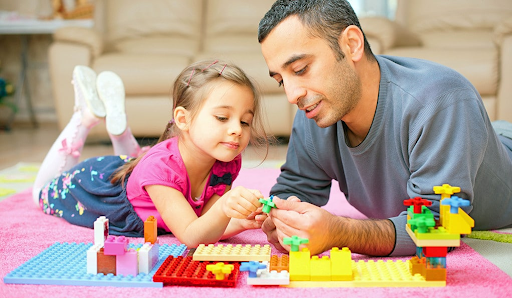The American Academy of Pediatrics identifies play as essential for child development and child wellbeing. Children work through challenges, develop new skills, and communicate all through play.
As my daughter has grown, she has found new ways of play to work through her newest challenges. In studying child development, I learned that children develop object permanence—knowing that something exists even when they are not actively noticing it—by the age of 8 months. As my daughter entered this phase of development, she began to take interest in games like peek-a-boo. In playing peek-a-boo, she was able to explore her new way of seeing the world and work through her feelings around separating from her parents (we disappear and then we come back again).
The AAP finds that unstructured play promotes healthy brain development, allows children to conquer their fears and practice new skills, promotes healthy and active bodies, and it’s fun!
Joining Your Child in Play
Parents who join their children in play give themselves an opportunity to see the world through their children’s eyes, increasing a parent’s understanding of what their child is going through. By setting aside time to join their children in unstructured play, parents also communicate to their children that they are accepted, understood, and loved. This can serve to deepen the parent-child bond and to foster more effective parent-child communication.
5 Tips for Parents During Unstructured Play Time
These guidelines have been adapted in part from Brittney George, LPC, NCC, PMH-C’s Rules for Parents During Play Time:
- Let your child lead: So much of children’s lives are controlled by the adults around them. Let this be a time where they can be in charge. Do your best to follow their lead without judgment. This will communicate to your child that their feelings matter and that you trust in their abilities, and it will give your child space to learn self-direction and self-control.
- Dedicate the time to your child: Make sure you are able to be fully present to your child during play. This means turning off your phone or leaving it in another room. And if you’re feeling dysregulated—at a heightened emotional state—take a minute to center yourself or identify that it’s not the best time for play. My colleague Ellen Meystadt, LPC-A offers some wonderful advice here.
- Get on your child’s level: Being on the same physical level as your child can help your child to feel safe and connected. That means if your child is playing on the floor, you are too.
- Keep it unstructured: In recent decades, children’s lives have become more and more scheduled, leaving less time for free play. Do your best to keep this time open and free: no agenda, no plan, no schedule.
- Have fun: If you’re like me, parenting for you has been a source of both much stress and much joy; your free time is limited, and your to-do list is long. Let play time be an opportunity for you to let go, destress, and enjoy being with your child.
Play at Any Age
As children get older, their approach to play will change. Parents can continue to find ways to connect with their child. Here are a few ideas:
- Find games and activities that allow for free expression, creativity, and flexibility. (Personally, I love Writey Drawey and Exquisite Corpse.)
- Be curious and co-participate in your child’s creative world, whether that’s their newest Roblox or Minecraft creation, TikTok, Dungeon & Dragons game, or fashion invention.
- Find time to just be with your child. Meet them where they are at and allow them to use the time how they wish, even if that means watching TV or a quiet walk.
- Give yourself and your child an excuse to be childish and silly–whatever that might be.
References & Resources
Special Parent-Child Play Times. by Bratton, S., & Landreth, G. New York: Routledge. 2020. https://cpt.unt.edu/sites/default/files/documents/parentresource1_specialplaytimeinstructions_togowithvideo.pdf
The Importance of Play in Promoting Healthy Child Development and Maintaining Strong Parent-Child Bonds, Kenneth R. Ginsburg, MD, MSEd; and the Committee on Communications; and the Committee on Psychosocial Aspects of Child and Family Health, Pediatrics (2007) 119 (1):182–191. https://publications.aap.org/pediatrics/article/119/1/182/70699/The-Importance-of-Play-in-Promoting-Healthy-Child?autologincheck=redirected?nfToken=00000000-0000-0000-0000-000000000000
Rules for Parents During Play Time: A Case for Filial Therapy, Brittney George, LPC, NCC, PMH-C, Therapy Den, Sep 24, 2019. https://www.therapyden.com/blog/rules-for-parents-during-play-time-a-case-for-filial-therapy












